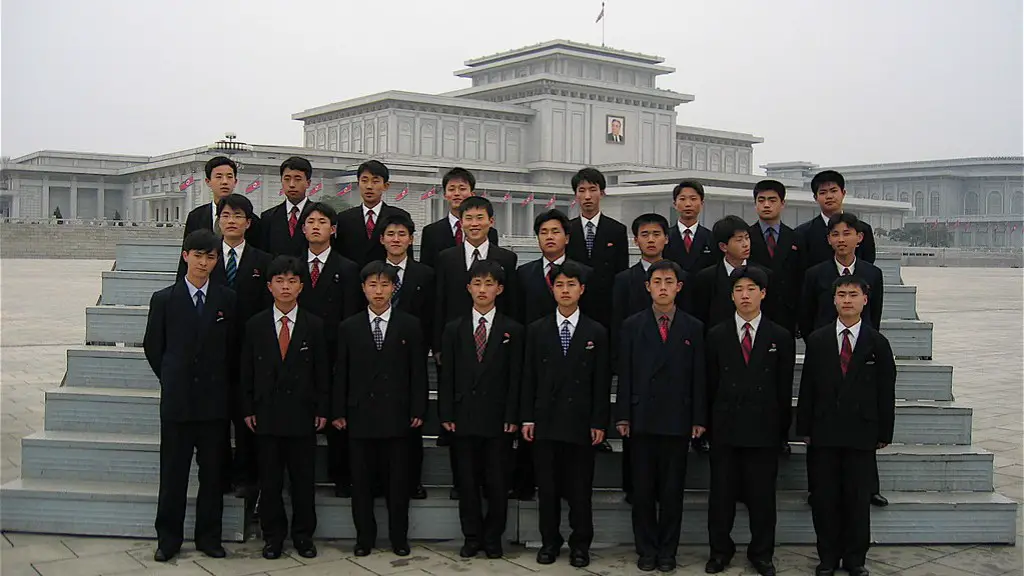Since taking office, U.S. President Trump has repeatedly referred to North Korea as a potential threat to world security. The prospect of North Korea planning to attack the U.S. has been a long-standing source of tension between the two nations. But is this a real possibility, or is the danger being overstated?
North Korea’s nuclear capabilities and its missile tests have caused understandable concern in the US. North Korea has tested several intercontinental ballistic missiles (ICBMs). These missiles have the capability of reaching most of the US, raising fears that North Korea could launch an attack. The most recent missile tests occurred in November 2017, when North Korea tested its most powerful missile yet, the Hwasong-15, which experts believe could reach the U.S. capital.
In response, U.S. President Trump has made it clear that the U.S. will not hesitate to respond with overwhelming force if North Korea threatens the US or its allies. Trump has implemented a policy of “maximum pressure” on North Korea, using economic sanctions and diplomatic isolation to pressure North Korea into denuclearizing. Despite this, North Korea has made it clear that it is willing to resort to military action if necessary.
In light of the escalating tension between the two countries, experts have warned that North Korea is prepared to use nuclear weapons if it feels threatened. North Korea has also hinted at its plans to attack US military bases in the region and has reportedly accumulated enough nuclear material to produce several nuclear bombs. This has led some to believe that North Korea is in fact planning to attack the US.
However, other experts are skeptical that North Korea is actually planning an attack, arguing that the country is more likely to use its nuclear capabilities as a deterrent. North Korea has a long history of saber-rattling to gain attention, and this could be what is happening now. In addition, North Korea is believed to be heavily reliant on the Chinese economy, and any attack on the U.S. could cause economic ruin for North Korea.
Ultimately, it is difficult to know for sure what North Korea’s intentions are. But one thing is certain: the situation is extremely tense. The US is closely monitoring North Korea’s activities, and the international community is hoping for a peaceful resolution.
Realistic Possibilities
The current belief is that while North Korea is clearly making attempts to increase its military capabilities and aggressively pursue nuclear armament, North Korea may not have the capability or the intention to unilaterally attack the US. North Korea has maintained for years that it is building its nuclear weapons for self-defense and that it does not have the intention of attacking the US.
US intelligence agencies have reported that North Korea’s nuclear program and the regime’s efforts to test longer-range missiles have progressed faster than expected. North Korea attempted its first intercontinental ballistic missile (ICBM) test in July 2017, and continues to test multiple weapons since then. These tests serves as a show of force, as well as a way to pressure the US into diplomatic talks.
Despite this, it is unlikely that North Korea is capable of unleashing a nuclear attack on the US without suffering catastrophic losses in the process. It is believed that North Korea has only a limited number of long-range ballistic missiles and the regime doesn’t possess the resources that are necessary to launch a coordinated and sustained attack.
North Korea’s nuclear program is thought to be centered around deterrence and they could potentially use their nuclear capabilities to put pressure on the US and its allies. Nuclear warheads could be used to threaten US allies in the region such as South Korea and Japan and this could be used to incentivize talks.
International Response
The international community has been working together to contain the North Korean threat. US-led sanctions have so far been unsuccessful in halting North Korean military activity but have managed to limit North Korea’s access to the international economy. Sanctions are meant to make it much more difficult for the North Korean regime to acquire the materials necessary for their military and nuclear programs.
Since October 2016, the UN Security Council has passed nine resolutions that aim to limit North Korea’s access to foreign currency, limit oil imports to the country, and prevent the sale of arms and other military hardware. These sanctions are had a crippling effect on the North Korean economy as they target the country’s primary sources of revenue.
The international community is hoping that the economic sanctions will eventually force North Korea to return to the negotiating table in the hopes of achieving a diplomatic solution to the current crisis. However, the North Korean regime is believed to be highly resistant to international pressure and the effectiveness of the sanctions are uncertain.
Nevertheless, the US and its allies in the region have continued to push for a diplomatic solution. US Secretary of State Rex Tillerson has said that the US is willing to negotiate with North Korea. US military officials have also reassured US allies in the region that they are committed to the defense of South Korea and Japan.
Public Perception
The fear of a possible North Korean attack has certainly had an effect on public opinion in the US. According to a CBS poll conducted in October 2017, 82% of respondents said that the US should use diplomatic measures to prevent a North Korean attack. Going further, 69% of respondents said that if diplomatic measures fail, the US should use military force.
Meanwhile, polls have found that the US public has been considerably more supportive of US President Donald Trump since he took a much tougher stance on North Korea. This demonstrates that the US public is not just concerned about the North Korean threat, but also supportive of efforts to contain it. This also suggests that the US public is willing to resort to military action if necessary.
However, there does remain a considerable amount of uncertainty as to whether or not North Korea is actually planning to attack the US. While some experts may argue that it is highly unlikely, others see the threat as a very real possibility. In the end, only time will tell what North Korea’s true intentions are.
Implications
The situation with North Korea is a complex one, as both countries refuse to back down. The US is committed to using diplomatic means to end the conflict, while North Korea has so far refused to negotiate with the US. This stand-off has raised serious concerns over the future of the Korean Peninsula and the wider region.
The current situation also has implications for US-China relations. China is North Korea’s main ally and has significant influence in the region. Chinese leaders have repeatedly called for all sides to exercise restraint, but have stopped short of taking concrete steps to de-escalate the situation.
The potential consequences of a conflict in the region are severe. North Korea has a large standing army, and any US-led military action could result in hundreds of thousands of casualties. The situation is further complicated by the presence of US military bases in South Korea and Japan, which could be targeted in a North Korean attack.
The consequences of any conflict would also extend beyond the Korean Peninsula, as it could potentially lead to a wider war that could involve other nations in the region such as China and Russia.
International Relationships
The situation with North Korea has put a considerable strain on diplomatic relations between the US and both China and Russia. Russia has criticized the US for its aggressive stance towards North Korea and has called for a peaceful solution through negotiations. China, meanwhile, is keeping a neutral stance on the issue and has asked for all sides to refrain from provocative actions.
The US has been keen to point out that China is largely responsible for the current situation. US officials have accused China of not doing enough to contain North Korea’s nuclear ambitions and have accused them of allowing North Korea to skirt around US-led sanctions.
But China has argued that more pressure should not be put on North Korea, as this could lead to instability in the region. China has also proposed a “freeze for freeze” solution, where the US would freeze military exercises with South Korea in exchange for North Korea freezing its nuclear program. However, the US has rejected this proposal.
The relationship between the US and North Korea is of particular importance, as it could potentially lead to a wider conflict with other nations in the region. As such, it is essential that both countries continue to engage in dialogue and work towards a peaceful solution.





